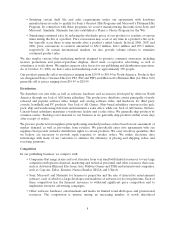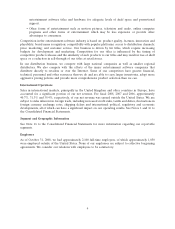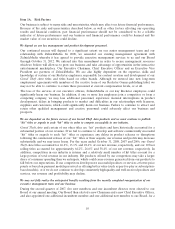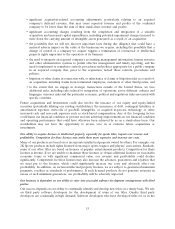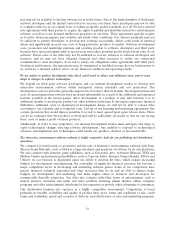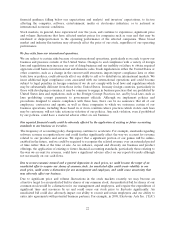2K Sports 2008 Annual Report Download - page 26
Download and view the complete annual report
Please find page 26 of the 2008 2K Sports annual report below. You can navigate through the pages in the report by either clicking on the pages listed below, or by using the keyword search tool below to find specific information within the annual report.past may not be available to develop software for us in the future. Due to the limited number of third party
software developers and the limited control that we exercise over them, these developers may not be able
to complete titles for us on a timely basis or within acceptable quality standards, if at all. We have entered
into agreements with third parties to acquire the rights to publish and distribute interactive entertainment
software as well as to use licensed intellectual properties in our titles. These agreements typically require
us to make advance payments, pay royalties and satisfy other conditions. Our advance payments may not
be sufficient to permit developers to develop new software successfully, which could result in material
delays and significantly increase our costs to bring particular products to market. Software development
costs, promotion and marketing expenses and royalties payable to software developers and third party
licensors have increased significantly in recent years and reduce potential profits derived from sales of our
software. Future sales of our titles may not be sufficient to recover advances to software developers and
licensors, and we may not have adequate financial and other resources to satisfy our contractual
commitments to such developers. If we fail to satisfy our obligations under agreements with third party
developers and licensors, the agreements may be terminated or modified in ways that are burdensome to
us, and have a material adverse affect on our financial condition and operating results.
We are subject to product development risks which could result in delays and additional costs, and we must
adapt to changes in software technologies.
We depend on third party software developers and our internal development studios to develop new
interactive entertainment software within anticipated release schedules and cost projections. The
development cycle for new titles generally ranges from 12 to more than 24 months. Development times and
costs of current generation software have increased substantially as a result of the additional and enhanced
features available in the newest games. After development of a product, it may take between 9 to 12
additional months to develop the product for other hardware platforms. If developers experience financial
difficulties, additional costs or unanticipated development delays, we will not be able to release titles
according to our schedule and at budgeted costs. Certain of our licensing and marketing agreements also
contain provisions that would impose penalties if we fail to meet agreed upon game release dates. There
can be no assurance that the products so developed will be sufficiently successful so that we can recoup
these costs or make a profit on these products.
Additionally, in order to stay competitive, our internal development studios must anticipate and adapt to
rapid technological changes affecting software development. Any inability to respond to technological
advances and implement new technologies could render our products obsolete or less marketable.
The interactive entertainment software industry is highly competitive both for our publishing and distribution
operations.
We compete for both licenses to properties and the sale of interactive entertainment software with Sony,
Microsoft and Nintendo, each of which is a large developer and marketer of software for its own platforms.
We also compete with domestic game publishers, such as Electronic Arts, Activision Blizzard, THQ and
Midway Games and international publishers, such as Capcom, Eidos, Konami, Namco-Bandai, SEGA and
Ubisoft. As our business is dependent upon our ability to develop hit titles, which require increasing
budgets for development and marketing, the availability of significant financial resources has become a
major competitive factor in developing and marketing software games. Some of our competitors have
greater financial, technical, personnel and other resources than we do and are able to finance larger
budgets for development and marketing and make higher offers to licensors and developers for
commercially desirable properties. Our titles also compete with other forms of entertainment, such as
motion pictures, television and audio and video products featuring similar themes, online computer
programs and other entertainment, which may be less expensive or provide other advantages to consumers.
Our distribution business also operates in a highly competitive environment. Competition is based
primarily on breadth, availability and quality of product lines; price; terms and conditions of sale; credit
terms and availability; speed and accuracy of delivery; and effectiveness of sales and marketing programs.
16




